Linz
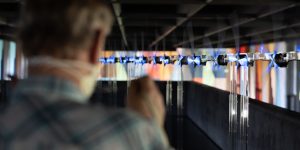
Transformation of Scenery
Yoichi Ochiai (JP)
In order to mediate between the massive landscapes composed by original nature and the massless landscapes described by digital nature, Yoichi Ochiai continues to create artwork for transforming scenery. Between mass and masslessness, he is searching for a longing for mass and a sentiment for pixels.
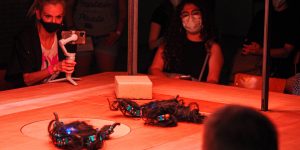
Simple Machines
Ugo Dehaes (BE)
Simple Machines is a lecture-performance in which we see how robots are born, from slimy cocoons to shiny machines. Through artificial intelligence, these creatures learn how to dance by themselves and create their own show.
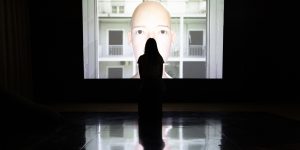
Not Allowed for Algorithmic Audiences
Kyriaki Goni (GR)
Just before being shut down, an Intelligent Personal Assistant (IPA) exhibits odd behavior. For a brief period of time every day, for seven consecutive days, it goes into a monologue introducing itself, talking about its skills, its ancestors, its anatomy and origins, and about voice and its significance. It reveals data regarding the listening infrastructure, as well as the social dysfunctions and bias on which its programming and training are based. On the last day, it shares a set of tips on how not to be heard.
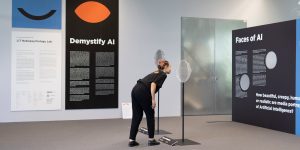
DEMYSTIFY AI!
LIT Robopsychology Lab JKU Linz (AT)
Enabling a more democratic, realistic, critical, and constructive discourse will need a demystification of AI and the promotion of AI literacy among the general public. Against this background, the LIT Robopsychology Lab presents an interactive area consisting of several installations addressing topics such as the explainability of machine learning systems, joint decision-making with a voice assistant, and current media representations of AI.
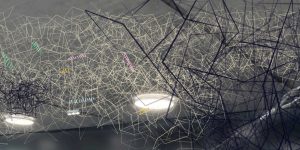
A Student’s Perspective
Lisa Caligagan (AT)
Much like the aftermath of the past COVID semesters still lingers, the textile data cloud "A Student's Perspective" hovers above us as a reminder, reflector and guide. Between countable minutes spent on Zoom and distances covered on walks, the visualization of distressing events overshadows the rest of the image.
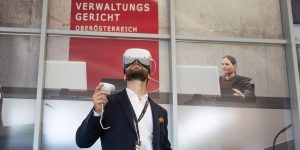
The Virtual Court. Reality.
Law Lab (AT)
The hearing is a crucial element of administrative and legal proceedings. It cannot be neglected in authorization processes, e.g. for new industrial plants or road construction, or in civil litigation and criminal trials. During the pandemic, video calls became the makeshift solution for hearings. But the question remains: could these new technologies be of further value to the state of law? With “The Virtual Court. Reality” the LIT Law Lab seeks to answer this question by introducing the court of the future in virtual space. Bring VR headsets instead of briefcases!
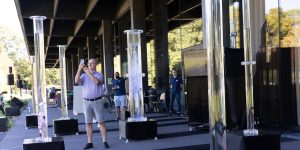
Do You Feel Stressed
Mark Hlawitschka (DE/AT), Moritz Simon Geist (DE)
DO YOU FEEL STRESSED is an installation in which rising air bubbles create sounds in water,to form a soothing, mesmerizing soundscape that invites the visitor to watch, listen and relax. The sounds are picked up by underwater microphones and amplified through loudspeakers.
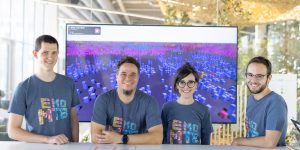
Music Tower Blocks (EmoMTB)
Markus Schedl (AT) Florian Fritzl (AT) Franz Schubert (AT) Alessandro B. Melchiorre (IT) Oleg Lesota (RU) Emilia Parada-Cabaleiro (ES) Vasco B. R. Fragoso (PT) David Penz (AT), Christian Ganhör (AT)
EmoMTB lets you explore large music collections in a novel way by navigating through a virtual city built around your favorite music. Through the use of AI technologies, you will receive song recommendations based on your musical taste and emotional state.

Growing Colors
Sabine Hild (AT), Institute of Polymer Science JKU; Julia Moser (AT), Fashion & Technology, University for Art and Industrial Design Linz; Patrik Radić (AT), Microbiology TU Graz; Laura Holzinger (AT), Chemistry and Chemical Technology JKU
There are qualities to bacteria that we may not be able to experience through our senses only. Our project makes visible the hidden colors of bacteria in our immediate environment. It shows their potential in the dyeing process for textiles, to make the world not merely more colorful — more blue, or yellow, or red—but also “greener“ and more sustainable.
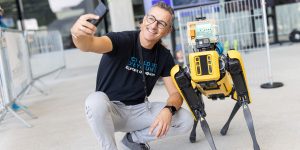
Magic Eye
Andreas Stelzer (AT) Institute for Communications Engineering and RF-Systems JKU, Andreas Müller (DE) Institute of Robotics JKU, Reinhard Feger (AT), Hubert Gattringer (AT), Masoud Farhadi (IR), Robert Sturmlechner (AT), Richard Hüttner (AT) all JKU
The perception of the environment under even the harshest external conditions is a prerequisite for autonomous vehicles and machines. Using the example of a millimeter-wave radar in symbiotic connection with a quadruped robot, the principle of the synthetic aperture and the detection of obstacles or hidden objects are shown in a playful context.

